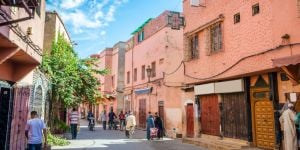Hi all -So yesterday my Moroccan wife and I went to buy an RV/mobile home so we could spend a few months or years travelling around this magnificent country, staying at hotels when we wanted to, and staying in the RV when we wanted to. We have previously met many people in the Atlas Mountains doing this and we were a bit envious and so wanted to emulate them! (We should, perhaps, have noted that they were all foreign, and the 'Moroccans' amongst them all had French, Belgian, or Dutch passports.)Imagine our surprise then when we were told by the dealer - and by the police who came to the showroom to confirm (!) - that:a) Foreigners cannot purchase/own a vehicle in Morocco (!) and;b) Moroccans cannot own RVs/mobile homes! So, my wife could not buy the RV because Moroccans cannot own RVs (!), and I could not but the RV because as a foreigner I cannot purchase any vehicle in Morocco! Why? Who makes these weird laws? Why do Moroccans put up with them? So now instead we have to go to Spain - where I *am* 'permitted' to spend my money (!) - buy a RV, and then bring the RV into Morocco! So I spend my money in Spain rather than in Morocco! Thus, through having all these silly laws, Morocco again shoots itself in the foot!Q1. Why are foreigners not allowed to purchase vehicles in Morocco?Q2. Why are Moroccans not allowed to purchase/own RVs?Answers on a postcard, please! -@Bill Shepherd
Hi Bill –
It’s frustrating to hear about the situation you’ve experienced. Let me try to clarify things and answer your questions as accurately as possible, providing insight into Moroccan laws and how they compare to practices in other countries.
Q1: Why are foreigners not allowed to purchase vehicles in Morocco?
To clarify, foreigners can purchase vehicles in Morocco, but there are specific conditions. A foreigner with a residency permit (carte de séjour) is allowed to buy and register a vehicle without any issue. However, without permanent residency, the law only permits temporary importation of a foreign vehicle into Morocco for up to six months under a tourist visa.
The rationale behind these rules is likely tied to control over the movement of assets and tax regulations, ensuring that only residents can own vehicles locally and preventing vehicles from being taken out of the country without accountability. Several countries impose similar restrictions. For example, in Thailand, long-term tourists must import vehicles temporarily, and only residents can register vehicles in their names.
If you don’t have a Moroccan residency permit, you could explore registering the RV under your wife’s name, but as you’ve discovered, there are additional restrictions around RV ownership for Moroccan nationals.
Q2: Why are Moroccans not allowed to purchase/own RVs?
This restriction stems from Moroccan law regarding vehicle classification and licensing frameworks, which are quite different from those in Europe. While Morocco has made significant strides in modernising its vehicle laws, RVs or motorhomes are still not widely recognised as a category for personal use under Moroccan motor vehicle legislation.
This is largely because the concept of living in a mobile home, even part-time, isn’t traditionally embedded in Moroccan culture. Additionally, the authorities might have concerns about the unregulated use of mobile homes—particularly around zoning laws, overnight parking, and tax classification—fearing that RVs could bypass existing controls that apply to hotels and short-term accommodations.
In contrast, countries like France and Spain have specific legal frameworks allowing RV ownership and infrastructure to support their use (e.g., dedicated parking areas and campsites). Morocco has yet to develop similar regulations, so the authorities may be applying older laws that restrict certain vehicle categories until the framework catches up.
Workarounds and Suggestions
You mentioned your intention to buy the RV in Spain and import it into Morocco. This approach is common among those wanting to own motorhomes in Morocco. You can bring the RV in under a temporary import permit (admission temporaire), which is valid for six months. If you decide to stay longer, you would need to exit the country temporarily and re-enter to renew the permit.
This situation reflects a broader issue seen in other countries too. For instance, in some parts of the UAE and Indonesia, residents face restrictions on registering certain types of vehicles or living in mobile homes, often due to similar regulatory concerns around taxation and land use.
While the restrictions in Morocco may seem odd or outdated, it’s important to remember that local laws often reflect cultural norms and regulatory priorities. If you plan to travel extensively through Morocco, purchasing the RV in Spain might be the most practical solution, even if it seems inconvenient.
Conclusion
Although Morocco’s vehicle laws may feel frustrating, they aren’t entirely unique when compared to other countries with strict regulations on foreign vehicle ownership or motorhome use. It’s understandable that such rules could deter investment and tourism, but they reflect the current legal framework and enforcement priorities. Hopefully, as the popularity of RV travel grows, Morocco will update its regulations to better accommodate modern travel trends.
Best of luck with your travels, and I hope you enjoy your adventures through Morocco—whether in a hotel or in the RV once it’s sorted!
All the best,
Arif Esa












